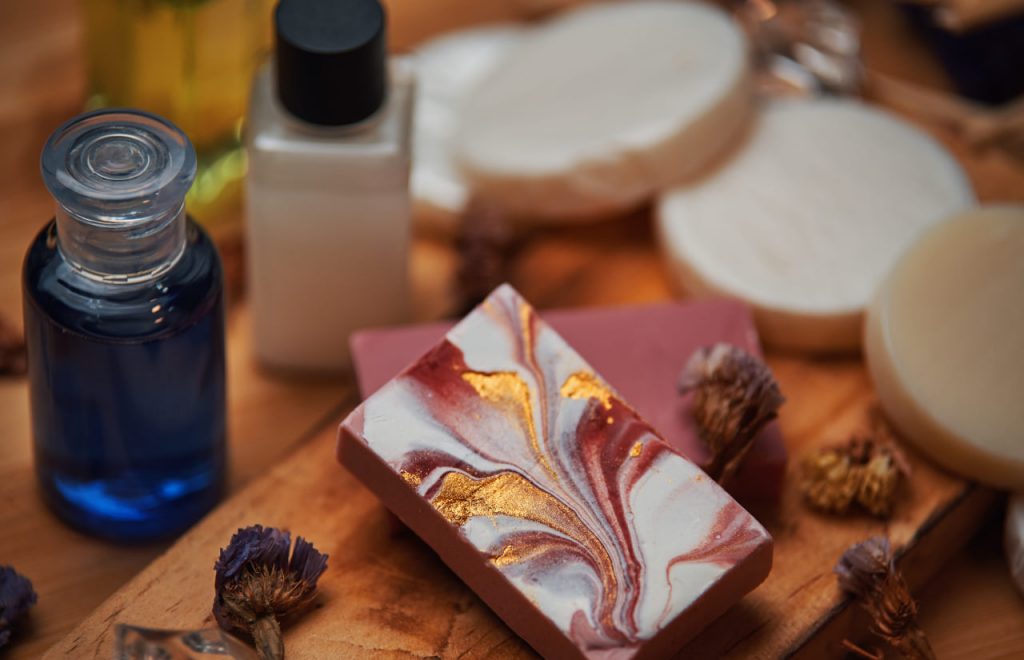Choosing the right oils for your handmade soap is essential for achieving the desired texture, lather, and moisturizing properties. Each oil brings unique benefits to the soap-making process, whether you’re aiming for a luxurious, moisturizing bar or one that lathers beautifully. In this article, we’ll discuss some of the best oils to use in soap making and the specific benefits they offer.
1. Olive Oil
Olive oil is one of the most popular oils used in soap making, and for good reason. It’s a gentle oil that creates a mild, moisturizing soap with a creamy lather. Olive oil is packed with antioxidants, vitamins, and healthy fats, making it an excellent choice for sensitive or dry skin.
Benefits:
- Moisturizes and nourishes the skin
- Rich in antioxidants like vitamin E
- Suitable for all skin types, including sensitive skin
- Provides a mild, creamy lather
2. Coconut Oil
Coconut oil is another essential oil in soap making due to its ability to produce a rich, bubbly lather. It’s also known for its cleansing properties and ability to harden the soap, making it last longer. Coconut oil helps to remove excess oils from the skin without stripping it of moisture, leaving your skin feeling clean and refreshed.
Benefits:
- Creates a rich, bubbly lather
- Has natural antibacterial and antiviral properties
- Helps to harden soap, making it last longer
- Works well for oily or acne-prone skin
3. Palm Oil
Palm oil is commonly used in soap making because it helps to create a firm, long-lasting bar of soap. It also contributes to a smooth, creamy lather. While there are environmental concerns surrounding palm oil production, choosing sustainably sourced palm oil can be a good option for soap makers who want to create a solid, high-quality product.
Benefits:
- Adds firmness to soap bars
- Contributes to a creamy, stable lather
- Long-lasting and durable soap
- Sourced sustainably, it can be environmentally friendly
4. Shea Butter
Shea butter is known for its rich, emollient properties. It’s a luxurious oil that helps to moisturize and protect the skin. Shea butter is particularly beneficial for dry or mature skin due to its high concentration of vitamins A and E, which are known for their skin-rejuvenating properties.
Benefits:
- Deeply moisturizes and nourishes the skin
- Rich in vitamins A and E, promoting skin health
- Improves skin elasticity and softness
- Helps with dry, flaky skin and reduces the appearance of scars
5. Castor Oil
Castor oil is often used in small amounts in soap recipes, as it creates a luxurious, dense lather that feels soft and moisturizing on the skin. It’s also known for its healing properties and can help soothe irritated or inflamed skin. Castor oil helps increase the shelf life of soap, preventing it from becoming too soft or sticky.
Benefits:
- Creates a dense, creamy lather
- Promotes healing of dry or irritated skin
- Helps to increase the shelf life of soap
- Great for sensitive skin and skin conditions
6. Sweet Almond Oil
Sweet almond oil is often used in soap making for its ability to moisturize and soothe the skin. It’s rich in fatty acids, which help nourish the skin and improve its elasticity. This oil is especially beneficial for dry or sensitive skin and is a popular choice for making gentle, skin-loving soaps.
Benefits:
- Moisturizes and softens the skin
- Improves skin elasticity and reduces signs of aging
- Ideal for dry, sensitive skin
- Adds a mild, smooth lather to soaps
7. Jojoba Oil
Jojoba oil is technically a liquid wax, not an oil, but it has similar properties to oils, making it perfect for soap making. It closely resembles the natural oils found in our skin, which allows it to moisturize and balance the skin’s natural oils. Jojoba oil is known for its anti-inflammatory and anti-bacterial properties, making it ideal for those with acne-prone skin.
Benefits:
- Balances and moisturizes the skin without clogging pores
- Helps to soothe inflammation and redness
- Ideal for sensitive or acne-prone skin
- Adds a smooth, silky feel to soap
Final Thoughts
The right oils in your soap recipe will make all the difference when it comes to texture, lather, and skin benefits. By choosing oils that complement each other, you can create soaps that cater to different skin types and needs, whether you’re looking for something soothing, hydrating, or purifying. Don’t be afraid to experiment with different oils to discover the perfect combination for your handmade soaps.
As you continue your soap-making journey, remember to consider the properties of each oil and how they contribute to the overall performance of your soap. With the right ingredients, your soaps will be a beautiful and luxurious treat for your skin.

